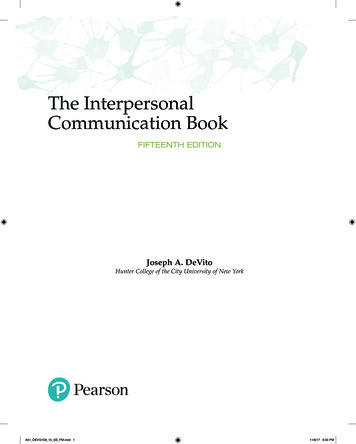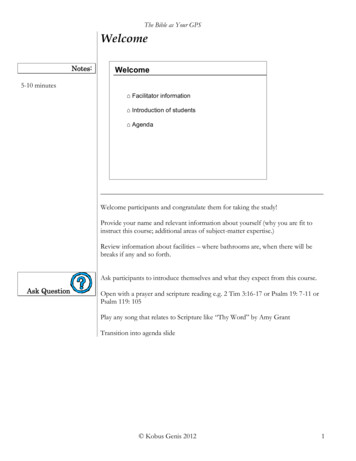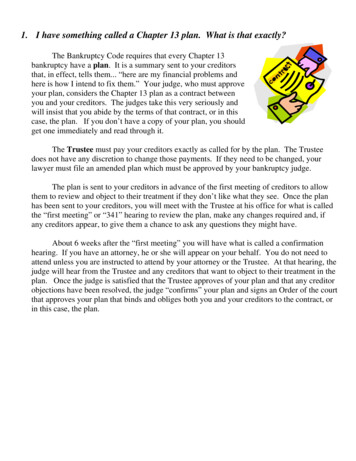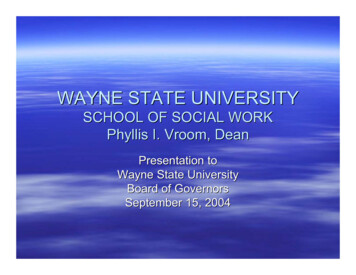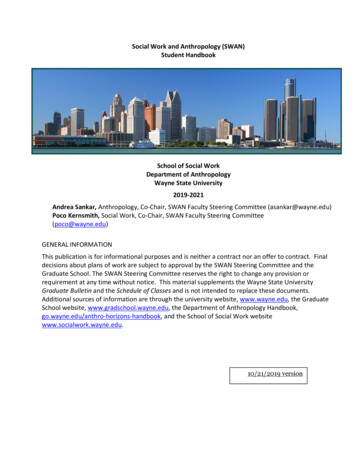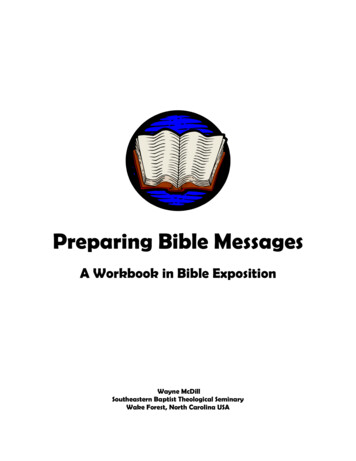
Transcription
Preparing Bible MessagesA Workbook in Bible ExpositionWayne McDillSoutheastern Baptist Theological SeminaryWake Forest, North Carolina USA
2002 Wayne McDillAll rights reservedPermission to duplicate granted upon request.Contact sebts.eduii
CONTENTSHow to Use this WorkbookvLesson 1The Messenger of God1Lesson 2The Written Word7Lesson 3Choosing a Bible Text13Lesson 4Copying the Text by Hand19Lesson 5Finding the Action Words25Lesson 6Marking Important Words31Lesson 7Noting What You See37Lesson 8Listing Bible Themes43Lesson 9Wording the Main Idea49Lesson 10Limiting the Subject55Lesson 11Looking for the Parts61Lesson 12Phrasing Major Points67Lesson 13Thinking of the People73Lesson 14Drawing Word Pictures79Lesson 15Telling Vivid Stories85Lesson 16Calling for Change91Lesson 17Aiming for Faith97Lesson 18Outlining the Message103Lesson 19Planning Your Preaching109Lesson 20Building the Body115Suggestions for the Teacher121iii
iv
How to Use this WorkbookPreparing Bible Messages is a workbook with 20 lessons on themethods for Bible preaching and teaching. It may be studied on an individualbasis. It may also be used as the textbook for a class in biblical preaching.Christian workers who wish to prepare effective Bible messages will findthat this workbook is written for them. They need not have higher education.They need not go away to school. They need not purchase additional textbooks.They need not even have a teacher.The textbook for this study is the Bible. The purpose of the study is topresent a method for using Bible texts as the basis for Christian messages. Theview of Scripture is also based on the Bible. The view of the church is Biblebased. The view of the messenger of God is based on the Bible.If you wish to study this workbook, do so with your Bible in hand. You willalso need a pencil or pen and paper. The key to success in the study will be thetime spent in the study of Bible texts. You may read all the lessons in theworkbook and still receive no benefit from it. Only as you take your own pen inhand and analyze the Bible texts will the study be helpful.The lessons are brief. The major investment of time will be in completingthe simple exercises at the end of each lesson. The more you repeat theseexercises with various texts, the more quickly you will become skilled in thismethod of preparing Bible messages.The best way to study this workbook is to work with other students. Apartnership will help each student involved. Those who seek to proclaim theword of God will be stimulated and encouraged by working together.Do not hurry in this study. Be patient as you work through these lessons.Do not become discouraged if this work is not easy. Preparing Bible messagesis not intended to be easy. It is the most important work the servant of God does.The life and work of the church depends on the effective proclamation ofScripture truth.If this study is helpful to you, pass along the information to others. As youbecome comfortable with this method, you will find that others will want to followthat example. Tell them where they can get the workbook. Perhaps take on theresponsibility of teaching another Christian worker.v
vi
Lesson 1The Messenger of GodYou are God’s messenger. If He has called you to bring thegood news of Jesus Christ to those who are lost, you are Hismessenger. If He has called you to plant new churches, you areHis messenger. If He has called you to teach his people whereverbelievers gather and worship Him, you are His messenger.Lesson 1God calls andenables humanmessengers todeclare his wordto the people.Human AgentsSometimes God has spoken through Angels (Judges 6:20).Sometimes God has spoken through dreams (Genesis 41:25). Godhas spoken with a still small voice (1 Kings 19:12) and with thesound of thunder (John 12:29). God even spoke one time througha donkey (Numbers 22:28). But God’s normal way of speaking toman is through his chosen servants. He spoke in every generationthrough his prophets to make his will known (Hebrews 1:1).God calls his messengers to speak his word to theirneighbors. Sometimes He calls them to go to far away places tospeak for Him. Jesus said, “Go into all the world and preach thegospel to every creature” (Mark 16:15). He commands them,“Preach the word! Be ready in season and out of season.Convince, rebuke, exhort, with all longsuffering and teaching” (2Timothy 4:2).What an amazing truth: God uses human messengers togive His message to mankind. His messengers often feel they areunworthy for such a task. Like Moses, they may complain, “O Lord,I am not eloquent, . . . but I am slow of speech and slow of tongue”1“How then shall theycall on Him in whomthey have notbelieved? And howshall they believe inHim of whom theyhave not heard?And how shall theyhear without apreacher?” Romans10:14
2(Exodus 4:10). Or, like Jeremiah, they may say, “Ah, Lord God!Behold, I cannot speak, for I am a youth” (Jeremiah 1:6).God does not accept these excuses. He does not call thosewho are capable; He makes capable those He calls. “Who mademan’s mouth?” He asked Moses, “Have not I, the Lord?” (Exodus4:11). He told Jeremiah, “Do not say, ‘I am a youth,’ for you shallgo to all to whom I send you, and whatever I command you, youshall speak. Do not be afraid of their faces, for I am with you todeliver you” (Jeremiah 1:7, 8).Though God’s messengers are weak and imperfect humanbeings, they bear a powerful and divine message. SometimesThe words of God’smessenger will beheard only if his lifeis faithful as well. Itis the silentmessage of hisattitude andbehavior that makeshis spoken messagebelievable.God’s messenger finds it hard to adjust to this divine calling. It isnot a small matter to speak for God. Paul said, “We have thistreasure in earthen vessels, that the excellence of the power maybe of God and not of us” (2 Corinthians 4:7). God’s message is atreasure and we are but clay pots. He is to receive the glory forusing such unworthy vessels.A Message without WordsGod’s messenger is not only a speaker for God, he is ahearer of God’s Word. He does not declare what he does notbelieve. The message of God is first in his own mind and heart andthen on his lips. When the people watch his attitude and behavior,they see that he lives what he preaches. “Let the word of Christdwell in you richly in all wisdom,” Paul wrote, “And whatever you doin word or deed, do all in the name of the Lord Jesus” (Colossians3:16, 17).The words of God’s messenger will be heard only if his life isfaithful as well. It is the silent message of his attitude and behaviorthat makes his spoken message believable. He cannot preach onemessage and live another. His word and his works must be one.
3Jesus said, “Let your light so shine before men, that theymay see your good works and glorify your Father in heaven”(Matthew 5:16). Notice how the light of our witness causes men tolook closely at our good works. That is always the case. If you sayyou belong to Jesus, others will watch to see if your life speakssilently about Him as well.If a person’s behavior is good, but he does not identify withChrist, others will say he is a good man, and fail to see that God ismaking him good. If his words are about Jesus, but he does notlive the life of a believer, they will call him “hypocrite.” Only as hiswords are clear and his works are upright will others look at himand glorify God for his life.The attitude of God’s messenger about his calling will affecthis message to the people. He can become proud. He can think ofhimself as better than the people. Instead of the ministry of JesusChrist through him, he can think of his calling as his own ministry.If his character is not based in biblical truth, those who hearhim preach will know it. There is no way to separate his characterand personality from his preaching. Who the messenger of God iswill have as much impact as what he says.The Messenger’s ExamplePaul urged Timothy, his young son in the ministry, to “be anexample to the believers in word, in conduct, in love, in spirit, infaith, in purity” (1 Timothy 4:12). Even though Timothy was young,he could show others how to live by his own example. He could befaithful with the silent message of his life. Then they would be morelikely to accept the spoken message of the gospel. The messengerof God must live what he preaches.This charge to the preacher sets a direction for his ownattitude. It names important qualities for his character. But it is“You, therefore,who teach another,do you not teachyourself? . . . Youwho make yourboast in the law, doyou dishonor Godby breaking thelaw?”Romans 2:21, 23
4more than that. It is also what the congregation needs if they are tohave respect for the messenger and his message.An example is a pattern to follow. Is it possible for a youngminister to be an example to older believers? Yes, it is. Whateveryour stage of maturity now, you can be a godly example. Eventhough you will continue to grow, you can earn respect and set apattern for others to follow. Remember this: you cannot be onekind of person and another kind of preacher.This verse names six qualities in which the preacher is to setthe pace for others. Examine these points of example more closelyRemember this: youcannot be one kindof person andanother kind ofpreacher.with me.First, the messenger of God is to set the example "in word."The people will not only note what you say in your sermons, theyare listening to what you say in everyday speech. They noticewhether your speech follows Paul's admonition, "Let no corruptword proceed out of your mouth, but what is good for necessaryedification, that it may impart grace to the hearers" (Eph 4.29). Ourspeech is to build up the hearers so that our very words ministerthe grace of God to them.Secondly, God’s messenger is to set the example in"conduct." This is his behavior and manner of life. The peopleexpect the messenger of God to live a life above reproach, in thesight of believer and nonbeliever alike (1 Tim 3.7). Thecongregation notices how the preacher treats his family, hiscourtesy to his wife, his handling of his children. They notice hismanners. They notice his attitude.
5Third, the messenger of God is to set the example "in love."Christian love is not an emotional response to others. It is a matterof decision and action. Christian love seeks the interests of others,to give them the good that God would want for them. Some of thepeople are hard to like, but the messenger of God is to love them.He knows that love "suffers long and is kind," that it "does not envy,. . . does not parade itself, is not puffed up" and so on (1Corinthians 13.4).Some translations include “in spirit” in this text. This canmean the attitude of God’s messenger. One expression of attitudeis his fervency for God’s work and His Word. The people will hearthe teaching and preaching of God’s servant for his passion asmuch as for his message. If the preacher is not passionate aboutthe message, will the people take it seriously? The way thepreacher delivers his message will determine whether the audiencehears what he has to say.The messenger of God is also to set the example is "infaith." Of all the qualities needed by the minister and the people,faith is most vital. Faith is the goal of every sermon. Out ofgenuine faith comes obedience. God’s messenger really believesGod's Word. He really trusts God to do everything He haspromised. If so he is setting the right kind of example for thepeople, whatever his age and maturity.The last quality named in the verse is "in purity." Themessenger of God is to set the example in his moral faithfulness.There is no place in the church for the stain of the world. You willsee moral failure all around you in your community. But God’smessenger must avoid even the appearance of evil. He will not“Let no one despiseyour youth, but bean example to thebelievers in word, inconduct, in love, inspirit, in faith, inpurity.”1 Timothy 4:12
6allow himself in a situation that brings doubt about his moral life. Aminister can be respected only if he is pure.There is much more to say about the preacher's characterand attitudes. The truth is simple: You cannot be one kind ofperson and another kind of preacher.Lesson Exercises1. Review the main ideas of this lesson:God calls human beings to take his message to others.God does not call those who are able; he makes able thoseHe calls.The silent message of our lives determines whether ourspoken word will be heard.2. Read of God’s call to Isaiah, Jeremiah, Jesus’ first disciples,and Paul. Write down what you see as the features of God’scall. (Isaiah 6:1-10; Jeremiah 1:4-10; Matthew 4:18-22; Acts26:12-18).
Lesson 2The Written WordIf God’s messenger is to be faithful to his calling, how will heknow what to say? Should the messenger declare his ownthoughts? Should he preach the traditions of the people? Shouldhe say what he hears others saying in their preaching? Should hepray for a new message that has never been heard? Does he haveto leave his home and go to school to learn what to say?Lesson 2God has given hiswritten word in theBible so that themessage can befaithfully preachedin every generation.These questions can all be answered by another question:Does the messenger of God have a Bible that he can read in hisown language? If he does, he can preach the Word of God. Thosewho have higher education may more easily understand the Bible.God’s messenger will want to get all the training he can. But thosewho can only read the Bible for its plain meaning can alsounderstand it.So the messenger of God can preach God’s Word if he willdeclare the plain message of the Scripture text. In this lesson, wewill think about the importance of God’s written Word.The Book of GodThe Bible is a book like no other. It is a book of books. In itare 66 books, 39 in the Old Testament and 27 in the NewTestament. The books in the Bible include history, poetry, songs,prophecy, letters, and sermons. The Bible tells the story of God’sworld from before creation to after the end of all things. Godrevealed himself to man through many generations. The collectionof that revelation is now our Bible.7Then the LORDsaid to Moses,‘Write these words,for according to thetenor of thesewords I have madea covenant with youand with Israel.’"Exodus 34:27.
8God used human writers to put his revelation into words.Each one lived in his own time and wrote in his own language.Each one wrote in his own words to the audience of his day.Though the message was spoken in the words of man, themessage was also the thoughts of God. Each Bible writer wrotewhat God inspired him to say.Different cultures from the Middle East are reflected in thesewritings—from Mesopotamia, to ancient Palestine, to Egypt, andback to Palestine. Many different peoples and cities and kings andwars are mentioned as God’s servants dealt with them. The Biblewriters wrote about how God involved himself in their ownPreaching must notbe about ancientreligious heroes andhow we can be likethem. Preaching isto be about God andhow we can trustHim.experience.Though the Bible tells the story of many ancient peoples, it ismainly about God. The great plan of God for the world and for manis revealed through the generations. God’s plan is fulfilled in Jesusof Nazareth, the Son of God. Whatever the text and whatever thetheme, the story of Jesus is the key.Jesus’ story is called the Gospel. This means “good news.”Paul defined the gospel, “that Christ died for our sins according tothe Scriptures, and that He was buried, and that He rose again onthe third day according to the Scriptures, and that He was seen byCephas, then by the twelve” (1 Corinthians 15:3-5). The death ofJesus on the cross was for the sins of the people. God gave Hisown Son as a sacrifice for sin so that we can be right with Him.That is the good news.Since the Bible is mainly about God, the preacher will wantto look at every text for what it tells him about God. Preaching mustnot be about ancient religious heroes and how we can be like them.Preaching is to be about God and how we can trust Him. It is notonly about the law of God. It is also about the grace of God by
9which He accepts us and enables us to live for Him. Preaching isto be about how to know God through Jesus Christ and live as Hisservants in this dark world.God’s Word WrittenSince God has given us His message in the written Word ofScripture, every messenger must go to the Bible to learn what tosay. God did not think it wise to have His message pass only fromone to another, from mouth to ear. Instead He wanted it writtendown so that the words would remain the same. He wanted themessage to be sure and clear for every generation.If we did not have the Bible as God’s written Word, thosefirst to receive His Word would have passed it along to others, andthen to others, and then to others. By the time the spokenmessage got to us, it might not be faithful to the original word. Godgave His words to Moses and told him to write them down. Godgave His words Jeremiah and told him to write them down. Godtold His first disciples to write down the story of Jesus.Do you remember the children’s game of passing a messagealong? The children sit in a circle. One thinks of a message andwhispers it to the next child. Then that child whispers the messageto the next one. And so, the message goes around the circle.Finally the last child announces what he heard the message to be.Most of the time he is uncertain about it. After he tells what hethinks he heard, the child who started the message tells what it wasmeant to be. Everyone gets a laugh at how the message waschanged .It would not be funny today if the message of God werecorrupted as it passed from one to another. God wants His peopleto hear a sure message from Him. The only way we can do that as“Now go, write itbefore them on atablet, and note iton a scroll, that itmay be for time tocome, forever andever:” Isaiah 30:8.
10His messengers is to give the people what He has to say in Hiswritten Word, the Bible.Some messengers who say they speak for God do not bringa word from His book. These preachers and teachers tell what theyhave heard from others. They tell about their dreams. They givetheir own religious ideas. They sometimes mix their old religionwith their new faith in Jesus. They may speak boldly and claimGod’s authority, but the message is not from God’s book.How much of what they say is from God? How can we knowif a message is from God? Does the preacher take God’s holyBook and explain what it says to the people? If he does not, is he a“For if I preach thegospel, I havenothing to boast of,for necessity is laidupon me; yes, woe isme if I do not preachthe gospel!”1 Corinthians 9:16faithful messenger?Faithful MessengersLike a herald sent by the King with an urgent message forhis people, God’s messengers must speak. We must keeppreaching, even when we are weary. We must keep preaching,even when we are threatened. We must bring the message of theKing or the people will not hear. We must speak it carefully, onlywhat the King wants to say. We must not give our own message.We are messengers, but the message is not ours. It is God’sOurs is a ministry of the Word of God. God has spoken andwe have His words in the Bible. In the Bible we learn how to putour faith in Jesus as our Savior. In the Bible we learn how to live asGod’s people in a corrupt world. In the Bible God has promised usHis forgiveness. He has promised us His power. He has promisedus a heavenly home.Unless God told us in His Word, we would never know aboutour Savior. Unless he told us in His Word, we would never knowthat God loves us, that God loves all men and calls them to be His
11children. Unless God told us in His Word, we would never knowhow to rejoice in our troubles.Without God’s Word in the Bible, we would never know howto pray rightly. We would not know how to love one another. Wewould not know how to live holy lives. None of these wonderfultruths come to the mind of man unless God tells him. And He tellsus in the Bible.When new believers put their faith in Christ, they do notunderstand the life of faith. Their minds are still filled with thethoughts of unbelievers. They do not know how to pray. They donot know how to obey God. They do not know how to be a light ina dark world. Who will teach them the thoughts of God? God callsand enables his messengers for that work.To be faithful messengers, we must first receive themessage we are to deliver. That means going to the Scripturesand discerning in them what God has said. Then we will make sureour lesson or sermon says what God says. We may have toexplain it to this generation. We may have to relate it to theexperience of our hearers. But we must not change the messageor present one of our own.The religious thoughts of a godly preacher may be helpful.He may think they sound very wise and challenging. But his ownideas will not have the effect in the hearers that the direct messageof God’s written Word will have. “‘For my thoughts are not yourthoughts, nor are your ways my ways,’ says the Lord. ‘For as theheavens are higher than the earth, so are My ways higher thanyour ways, and My thoughts than your thoughts’” (Isaiah 55:8, 9).The preacher’s challenge, then, is to have the message ofthe biblical text become the message of the sermon. That is faithfulpreaching. The word of God is “living and powerful, and sharperThe preacher’schallenge, then, is tohave the messageof the biblical textbecome themessage of thesermon. That isfaithful preaching.
12than any two-edged sword, piercing even to the division of soul andspirit, and of joints and marrow, and is a discerner of the thoughtsand intents of the heart” (Hebrews 4:12). When the message of thetext becomes the message of the sermon, the people hear the wordof God.In this workbook, you will learn how to let the ideas of Godfrom the Bible speak through the message you give to the people.That is your job as the messenger of God. You are to speak themessage of God. Even though the message is through your voice,it will be God’s message. Even though the message is in yourlanguage, it will be God’s message. Even though you explain itaccording to the life of the people, it will be God’s message.Lesson Exercises1. Review the main ideas of this lesson:The Bible is the Book of God and tells of his dealings withmen through many generations.The Bible is about God, particularly about his Son, JesusChrist, the Savior of the world.Believers can know the thoughts of God and understand thetrue faith only from the Bible.The faithful messenger will judge his own thoughts by ideasfrom the Bible and teach the people what God says.2. Read these texts about God’s Word and write down the mainideas in them. What do you learn about God’s Word that youdid not know? (Deuteronomy 4:1-8; Psalm 119:9-16; Isaiah55:8-11; Hebrews 4:12).
Lesson 3Choosing a Bible TextThe first task in preparing a Bible message is choosing atext. In this study, we will show you that every Bible message canbe based on the ideas in a particular text. Instead of teaching hisown ideas, God’s messenger will teach the ideas of God from aBible text.A text is a portion of Scripture selected for teaching orLesson 3The first task inpreparing Biblemessages is tochoose a specifictext.preaching. It can be as little as one verse or as much as severalchapters. Modern Bible translations very often show these sectionsof Scripture for the reader. Though the messenger of God may notchoose to follow the divisions in his translation, they will usually behelpful.A text should be long enough to serve as the source for asermon and short enough to be manageable in the time available.In the letters of the New Testament, a text may be only a fewverses. This is so because the letters have so much to say in sucha few words. Look at Romans 12:1 and 2. In the stories of the OldTestament, however, the text may include more than a chapter.Consider the call of Moses in Exodus 3 and 4.The messenger of God will choose a text that fits the need ofhis audience. He will pray and ask God to lead him to the right text.God will lead the messenger of God to the kind of Bible texts andthemes the people most need to hear.13Preparing theMessageChoose a textCopy the textAction wordsImportant wordsObservationsBible themesThe main ideaA limiting themeSupporting ideasMajor pointsThe PeopleWord picturesTelling storiesApplicationAiming for faithOutlining
14Why Choose a Text?If the messenger of God is to teach the people the truth ofGod, how will he decide what to say? He could talk about his ownreligious ideas. He could speak of what he hears other teachersand preachers saying. He could tell stories of his own experiencewith God. He could talk to the people about how they shouldbehave. All of these words may be helpful, but the messenger ofGod should deliver the message of God.God has given his message to man in the book we call theBible. He did so because He wanted his words to be guarded fromchange and corruption. He wanted his truth to be read by everygeneration until Jesus returns. There is no book like the Bible. It isa precious treasure from God for his people. The Christian faithThere is no booklike the Bible. It is aprecious treasurefrom God for hispeople. TheChristian faithcannot beunderstood apartfrom the words ofthe Bible.cannot be understood apart from the words of the Bible.Choosing a text keeps the messenger of God from talkingabout so many ideas at one time. It is better to teach the peopleabout one great truth from God in one lesson. Sometimespreachers speak about many ideas that come to mind while theyare talking. They do not have a clear message from God and thepeople become confused. The preacher with one text to explaincan talk about the one message of that text.Choosing a text from the Bible gives the messenger of Godauthority to speak. When his message comes from God’s book,the people will listen because they are hearing from God. Theauthority of God’s servant is closely tied to his confidence in theBible and his preaching from it. The people will trust him as aleader because he submits himself to God’s Word.Choosing a specific text for the lesson or sermon allows thepeople to follow his teaching in their own Bibles. If the people haveno Bibles, the preacher can show them the words in his own. Ifthey have Bibles, they can look at the words and make sure the
15messenger of God is presenting what God says. This allows thebelievers to gather around the Scripture with God’s servant andhear from God together.Different Kinds of TextsWhen the preacher chooses a text for each message, hesoon learns that the Bible is made up of several different kinds ofwriting. Some of the Bible books are mainly history. Some arecollections of God’s laws. Some are mostly poetry. Some areprophetic. Some are accounts of the life of Jesus. Others areletters. Most of these books contain a mixture of various kinds ofwriting. Each text has its own form.Most of the Bible is written as stories. These stories tell ofthe history of Israel. They tell of Abraham, Isaac, and Jacob, thefathers of faith. They tell of great heroes like Joseph, Gideon,David, and Daniel. The Bible stories tell about tribes and nations,battles and wars, glory and disaster. In the New Testament, thestories are about Jesus and his disciples. They are about thegrowth and struggles of the early church.Even though some stories tell about real people and events,they are really about God. God’s great plan for the ages of historyand eternity is in the stories. God’s love for man in his sin is madeclear. The coming of God’s Son to pay the price for man’s sin isthe great story, the Gospel. The word “Gospel” means “goodnews.” The story of Jesus is good news for all who believe.Other stories in the Bible are not about real people andevents. But they have in them the truth of God. Jesus toldparables to help his disciples understand the truth of God. Heknew that the people would remember a story better than a law.He knew they would understand his teachings much better if hedrew a word picture they could see in their minds.“You, through Yourcommandments,make me wiser thanmy enemies; Forthey are ever withme. I have moreunderstanding thanall my teachers, ForYour testimonies aremy meditation.”Psalm 119:98, 99.
16Other kinds of texts in the Bible are poetry and songs. Thebook of Psalms is poetry. It is made of songs to be sung. It is theworship book of the Bible.Prophecy is also an important kind of Bible writing. Theprophets of the Old Testament preached to the people about whatGod expected of them. Many of them also wrote down their“How can a youngman cleanse hisway? By takingheed according toYour word.With my wholeheart I have soughtYou; Oh, let me notwander from Yourcommandments!Your word I havehidden in my heart,That I might not sinagainst You!”Psalm 119:9-11.sermons. They told something about their lives as well.The Bible also has letters in it. Though there are a fewletters in the Old Testament, most of them are in the NewTestament. These letters were originally written to believers by theclose followers of Jesus after he had returned to heaven. Theywere written to teach the people what to believe and how to live.Planning Your PreachingPlanning your preaching ministry is largely a matter ofchoosing and studying the biblical texts you will use. Once youhave chosen the text, preparing a sermon is mostly the study ofthat text. The plans you make for preaching will depend on theopportunities you have and the nature of your audience.If you are planting new churches, your preaching andteaching will be designed to introduce interested unbelievers to theChristian faith. If you are serving in an established church, you willwant to feed that flock with Bible truth. Remember, the messengerof God is faithful only when he brings the message of God from Hiswrit
Lesson 18 Outlining the Message 103 Lesson 19 Planning Your Preaching 109 Lesson 20 Building the Body 115 Suggestions for the Teacher 121 . iv . v How to Use this Workbook Preparing Bible Messages is a workbook with 20 lessons on the methods for Bible p

